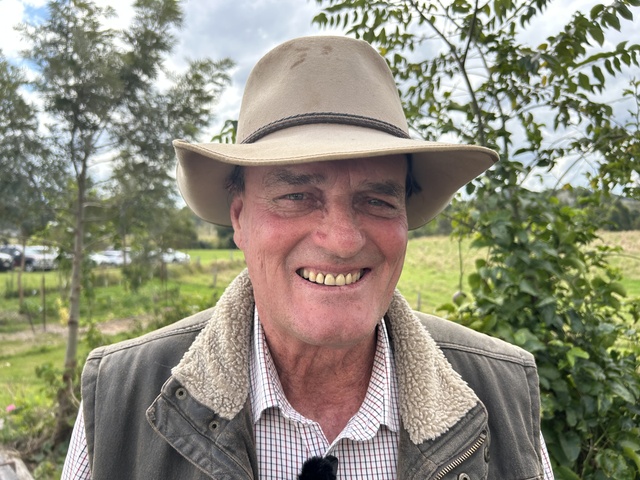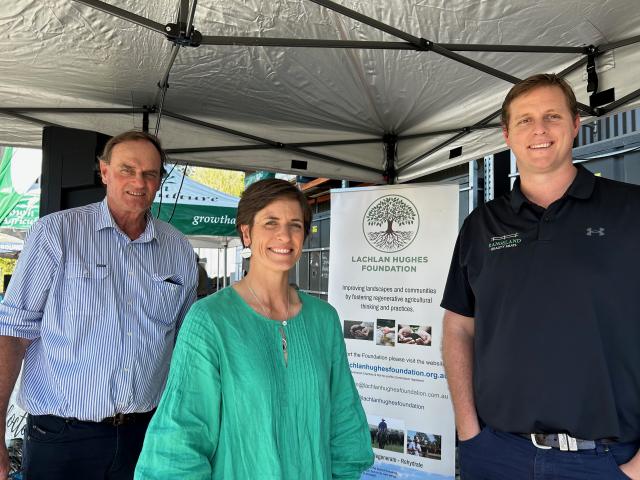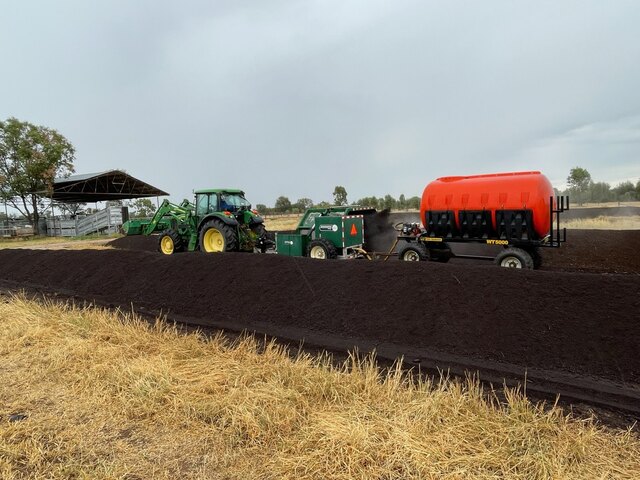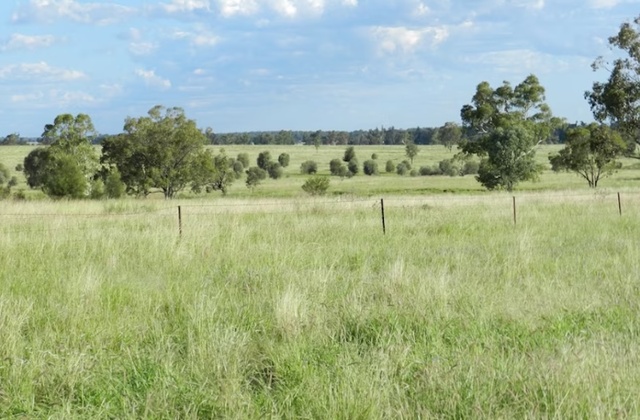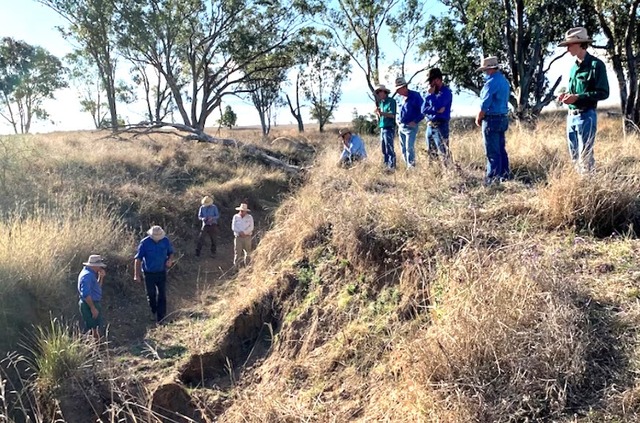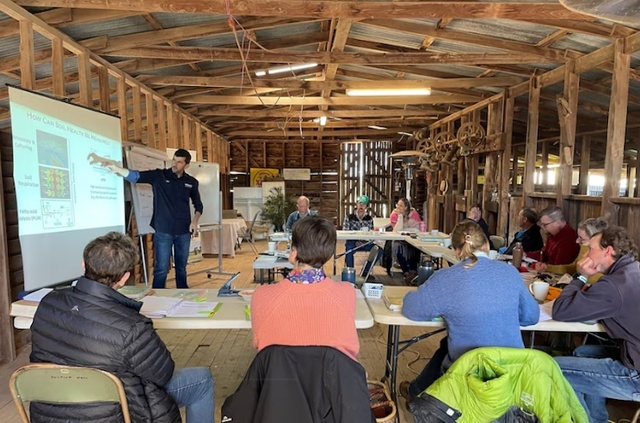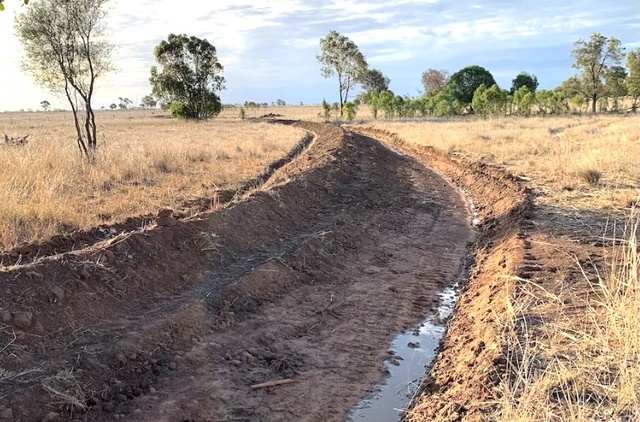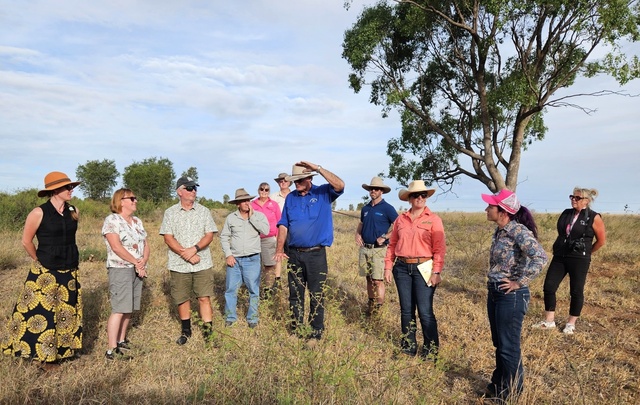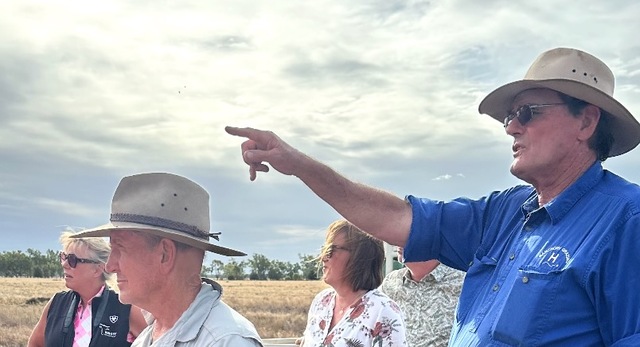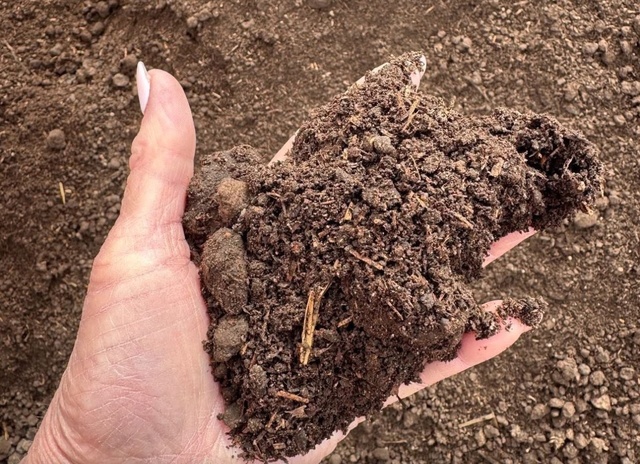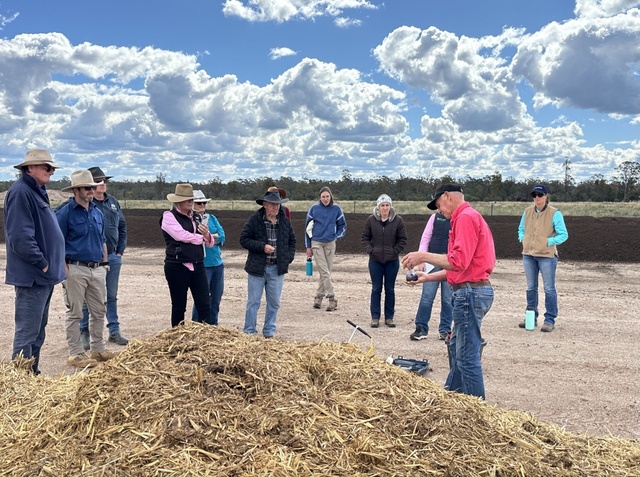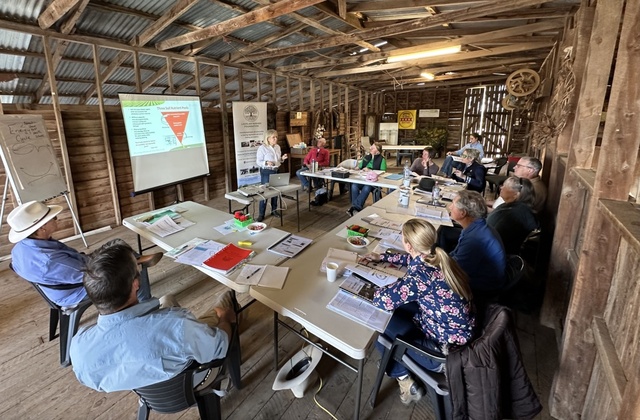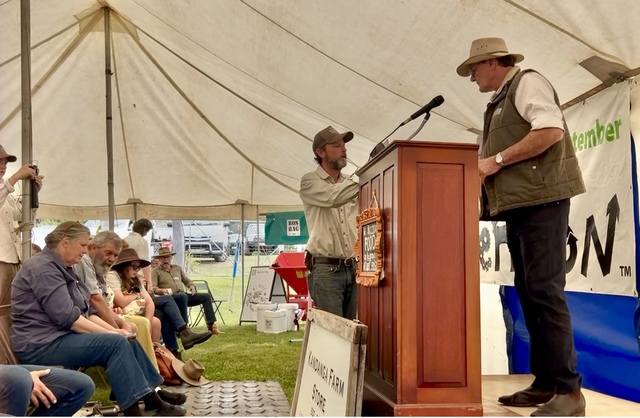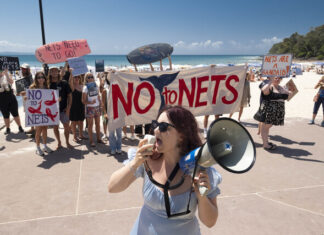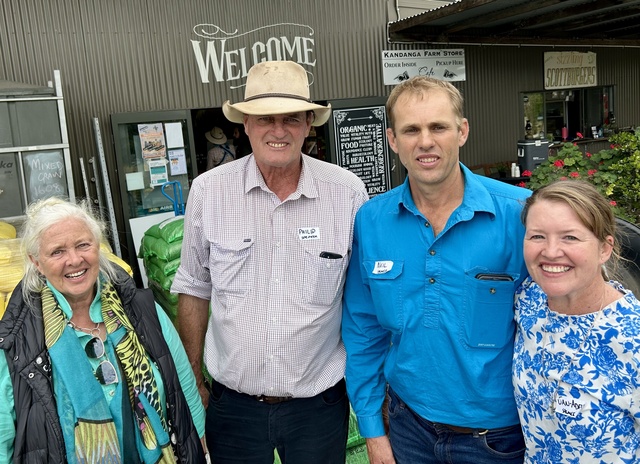
As if farming isn’t hard enough, it can be devastating when you lose a family member through an accident on the property. ERLE LEVEY was at Kandanga to hear grazier Philip Hughes talk about the loss of their son Lachlan, and how they have responded to create a legacy in his name.
“I don’t care how good it is, just do something.”
It’s one thing to talk about how things could be different.
It’s another thing to do something very significant to make a change.
This often involves relying on your instincts but also something that comes from within. Something much deeper.
That’s what Maranoa grazier Philip Hughes has found.
Speaking at the 2025 Agvention field day at Kandanga, Philip outlined how the Hughes family reacted to the tragic on-farm loss of their eldest son Lachlan.
That was on 31 October, 2018. He was 36, married and with a young family.
At times heart-wrenching, Philip spoke about the accident and the legacy that Lachlan has left behind.
Not only that, he wanted to talk about the need to retain balance in life.
It’s like a three-legged stool – that there are three essential components and these must be present for a system or concept to work properly.
If one “leg“ is weak or missing, the entire structure becomes unstable or fails.
The analogy can be used in different settings but generally relates to taking care of people, planet and profit.
It’s something Philip has learned in the close-on seven years since Lachlan’s accident.
It was what they would do on the farm many times. Yet for some reason on that day, while mixing grain from the silo, the auger over-balanced/toppled over and knocked Lachlan unconscious but it also broke his neck.
After such a disastrous event, Philip implored those at the Kandanga workshop to do something positive – emphasising that actions are more important than words and that people’s true nature and worth show through.
Anyone would have trouble recovering from an event such as this, but the Hughes family gathered together and decided to make a lasting legacy and continue the work that Lachlan had made his life.
Lachlan met Anna, his wife of 10 years, while studying agribusiness at the University of Queensland, Gatton.
Together they were dedicated and passionate about leading a healthy life, while living and working in the rural industry.
Lachlan bred Australian Stock Horses and was an enthusiastic polocrosse player, representing Queensland on four occasions.
Heatherlea, at Dulacca, was Lachlan and Anna’s home and where they adopted regenerative farming methods. They have three children, William and Georgia, and Hamish Lachlan born in March 2019.
Philip and wife Adele, Anna and their children, together with younger brother Alister and his wife Jules intend to carry on Lachlan’s dreams.
He believed it is possible to rebuild Australia’s soils and increase their sustainable production capacity to withstand the variability’s of rainfall and that this in turn would revitalise rural communities and improve the economic sustainability of the industry.
That brought about the creation of the Lachlan Hughes Foundation in 2019, to support people who are motivated ’to do’ and are ’implementers of change’ and ’champions for regenerative agriculture.’
It reflects what the Hughes family does at home.
“I don’t care how good it is, just do something,’’ Philip said.
“On 31 October, 2018, it was a normal day perfectly normal day.
“Lach and I had spoken together and made plans, and we were fixing some grain to be sent north.
“He was pushing an auger up to a silo … it counter-balanced and flicked over and for some reason it knocked him out and broke his neck.
“That’s how quick life can be,’’ Philip said, his voice filled with emotion.
“In this day and age we’re so used to medicine to keep us alive – all sorts of crazy things – so we don’t have this concept that life is a very, very fine silk strand.
“Always value the people you have around you. Tell them … because it can be gone in a moment.’’
Between the accident and the funeral, the family talked about starting a foundation.
So instead of flowers, Philip said it was agreed to put money into an account.
“After about 10 months, we found some fresh air and it was time to put our heads up.
“We sat around and worked out a plan – a mission statement – in order to pursue charity status.
“At the bank we told the manager the story and he put the first $100 into the account.
A board was put together to manage the foundation. That saw the creation of the Tree of Life award, because Lachlan was passionate about organic living, regenerative ag and about doing things.
“It really used to tick him off when people would come to an event and they would love it,’’ Philip said, “… it was right up their alley.
“But they would do nothing about it. Instead, they would just revert back to the same old ways.
“Part of what we do in the foundation is about doing something.
“Lachlan always said, ’It’s about putting life back into the land’.“
The initial goal of the Lachlan Hughes Foundation was to continue to develop his vision by providing an annual scholarship, linking one young land manager with regenerative agriculture professionals for training and mentoring.
After three years this developed into a 12-month program of four two-and-a-half day modules with up to 10 participants annually.
The program is regenerative-agriculture based, outcomes focussed, and includes capacity building, personal development, training and mentoring.
Participants attend workshops at the Hughes properties at Dulacca, but also set a program to undertake on their own property.
That is then presented to others in the program for evaluation and inspiration, discussing the outcomes – highlighting the achievements but also outlining the constraints.
“For the first three years we called for nominations, selected a person and put a project up to have a look at it.
“Then we would work out a course to make it come about.
“In the third year we had three really good applicants so we decided to help those people as well.’’
Together with professional trainer and coach Barb Bishop, a program was put in place. The four-module program runs throughout the year and doesn’t cost participants anything.
“We’re very proud of the idea,’’ Philip said. “The programs are run 100 percent on donations, and there is a celebratory module at the end.’’
Fellow speakers at Agvention 2025 were Neil and Jan-Adele Reinke, Central Queensland graziers who were the first Tree of Life award recipients.
That was in 2023, and they have overcome severe health setbacks to take advantage of Neil’s background in forestry as well as a family history in cattle to integrates trees, forages, and livestock on the same land in a way that is mutually beneficial.
Neil suffers from deteriorating eyesight as well as suffering a freak horse accident resulting in a broken neck.
That was the catalyst for a concerted effort to fix up a systemic erosion problem on their property.
Out of the group of Lachlan Hughes Foundation scholarships that has a maximum of 10 a year, a Tree of Life winner is given support for another 12 months.
“We’re very proud of what we do,’’ Philip said. “None of us are young, so we don’t have to compete – we can give back.
“There is an amazing bunch of people around us. It’s not about us. It’s about the team and the family. It’s timing.’’
As well as the foundation, Philip wanted to talk about having balance in life.
Other speakers at Agvention reinforced that most turn to regenerative agriculture from some form of stress, whether it be financial, health or family trauma, as in Philip’s case.
“We were in regen ag before that accident but what we find is that when you open your mind and you start together, you go on this new regen journey. It’s just questioning old ways and asking can we do it better?
“Being in harmony with the land … when you open your mind, you become very passionate.
“You really want to share this with everyone. You want everyone to get on the train, but what I’m trying to tell you is – have that passion.’’
Speaking as someone who has seen much of life, Philip said it was very difficult to be a producer, processor and marketer, which is what the Hughes family has been on their properties.
“It’s a very tough road to follow, so you need to be careful and that’s why I want to talk about balance.
“You need to keep the three-legged stool. Keep that balance in whatever you do.
“We use that analogy a lot. If one leg breaks then something is not right – you’re going to tip over.
“I like to talk about soils. Whatever your enterprise – it can be anything you like to make a quid off the land – but your soils are the mother … the mother of the land and the environment, your enterprise and your lifestyle.
“The first leg to go is often the lifestyle. You’ll put your heart into it but find you’re not making any money.
“Then, if you’re too focused or too highly geared, the soil is the one that suffers.
“We are really big on balance. Make sure that you analyse whatever you do. And bring balance into it.’’
Speaking broadly about the path the Hughes family follow with their grazing, they were inner circle suppliers to Coles.
They had a great product and a great story about a family business following the regen road … hormone-free, antibiotic-free beef without the use of feed additives to change the balance of rumen microbes.
Instead, they utilised probiotics and biochar to improve gut health, potentially reduce methane emissions, and increase feed efficiency.
“We are really passionate and wanted to share this with people, so we decided to market the beef ourselves.
“Everyone said it was going to be a tough road, but said we could handle it.
“With Rangeland Quality Meats we had a name to be a niche supplier with a high-quality, low-volume product.
“We started with a butcher shop at the back of a supermarket but found out that we couldn’t make money because retail is a totally different animal to being a producer.
“So we decided to get into a supermarket, where the money is. However, once you put a knife into meat and you’re competing with big players, you are in trouble.
“We went to online food boxes and then to farmers markets. They are wonderful places – a wonderful community, and we spend a lot of time there.
“The trouble is there’s low volume so we’ve moved to a wholesale business.’’
What farmers have to understand, Philip said, was that in the ’70s and ’80s globalisation was embraced.
The philosophy from that was to become more efficient but the end result was to see what has been done to Australia’s dairy industry – deregulation has virtually destroyed it.
“What happened with globalisation is that we ended up with these mega companies. It was a matter of think big or get out. We know them all.
“So you’ve got a whole generation of people who are conditioned to buy stuff cheap – that’s what you’re competing with.
“You need to understand that you either get into the big game and you become a low-margin, high-volume supplier or you can stay in the game and be a high-margin, low-volume supplier.
“The problem with that is you don’t have enough turnover to keep the stool in balance. Somewhere one of those legs has to compensate for the others.
“Unless you really work it out, it doesn’t matter whether you’re a producer, processor or marketer. You can be both or all three but it’s a hard road and you need a good bank account.
“We tried to go broke for five years … but after 15 years we found our niche and we’ve got some really good clients.
“When you start, you have to realise that everyone is buying product from someone else and you have to work out how to capture them.
“If you’re playing in the big game it’s price. That’s how people buy it.
“Whether we like it or not, people may pay $50 for a chicken but when auntie goes to Woolworths and sees one there for $10 it gets really hard to be loyal at the end of the day.’’
For Phillip, the improvement of the land and their system is a work in progress rather than a revolution.
They measure everything and sit down and think strategically about it.
The family philosophy is to farm to the very best of their ability using the productivity and analysis tools they have available, while at the same time doing all they can to improve the soil, the pastures and environments.
It’s an ever-evolving process, so continual education and updating of ideas and practices is always something they are on the lookout for.
Through the Lachlan Hughes Foundation they are also able to give something back.
Isn’t that the attitude to have in life – that with everything, with every choice we make should be with a glass that’s full mentality, never half empty.
I have an autograph by former Australian test cricket captain Steve Waugh: “Always 100.’’
Can you imagine if we all lived life that way?

